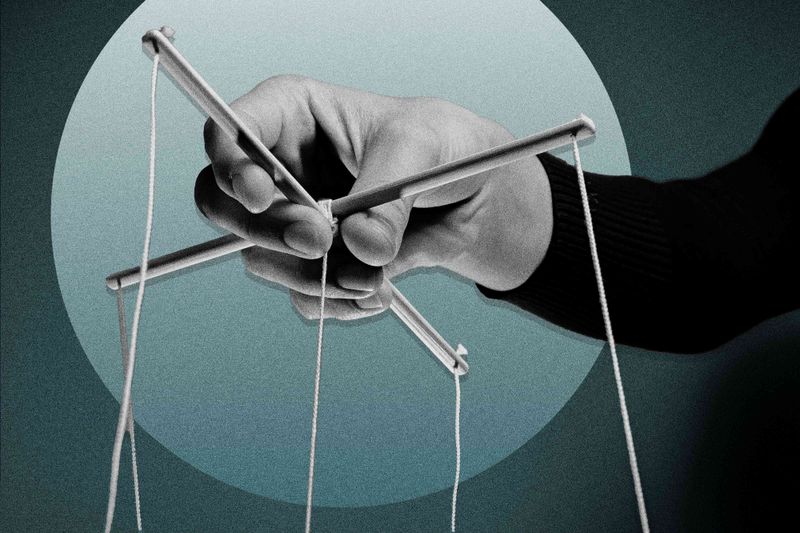Older narcissists often have years—decades—of practice in emotional manipulation. They’re smooth. Convincing. Sometimes even charming in a “but-they’re-so-nice-to-everyone-else” kind of way. But underneath the surface? Control. Guilt. Mind games.
And the worst part? Their weapon of choice isn’t always yelling or rage—it’s words. Subtle, twisted phrases that make you question yourself, doubt your memories, and shrink your worth.
Aqui estão 20 phrases older narcissists use to trap you, confuse you, and keep you exactly where they want you—under their thumb.
1. “After everything I’ve done for you…”
Ever feel like someone’s tallying up your life like receipts at tax season? That’s what this phrase is all about—reminding you, with dramatic flair, of every little thing they claim to have done for you, even if it was decades ago or came with invisible strings attached.
Suddenly, gratitude becomes a payment plan, and you’re supposed to stay forever in their debt. It’s not love; it’s emotional accounting. The more you try to repay, the higher the bill grows.
When you hear this, press pause and remember: genuine care isn’t transactional. Your worth is not measured by how many times you say “thank you” or what you sacrifice for someone else’s ego. Healthy relationships don’t keep score or demand interest on kindness. Don’t let anyone use your own empathy to cash in on your guilt. You’re allowed to receive love without being “billed” for it later.
2. “You’re just being too sensitive.”
Ever had your feelings shrink-wrapped and shoved back in your face? That’s exactly what’s happening here. Instead of listening when you’re hurt, they slap a “too sensitive” label on you and toss aside whatever you said, like your emotions are a messy inconvenience.
Suddenly, you’re second-guessing every reaction, wondering if maybe you really do overthink everything. Spoiler: You probably don’t. You just care, and they know it.
The trick is, when someone calls you “too sensitive,” they’re really saying, “Your feelings disrupt my comfort.” Your emotions are valid—period. Let’s be real: sensitivity is not a crime.
You don’t have to harden your heart to make someone else comfortable. Trust your gut, not their gaslighting. Remember, your reactions mean something, and you deserve to be heard in any relationship, no matter how much they try to minimize you.
3. “I’m only telling you the truth—no one else will.”
Ah, the “truth-teller”—also known as the self-appointed judge and jury of your life. This phrase slips out when the narcissist wants to cloak their meanness in a robe of honesty. It’s not about sharing wisdom; it’s about power.
They’ll say something hurtful, then insist it’s for your own good—like a bitter pill you should be grateful for. It’s a nasty trick: you end up doubting yourself, thinking maybe you really do need their “truth” to see clearly.
But here’s the thing: real honesty doesn’t leave you feeling smaller. Genuine advice builds you up, it doesn’t tear you down. If someone’s “truth” only serves their ego and leaves you hurting, it’s not truth—it’s control. You’re allowed to question motives and protect your self-esteem, no matter how wise or worldly they pretend to be.
4. “You wouldn’t survive without me.”
Some people love to play the hero in a story they wrote themselves. This phrase is their signature move—reminding you, not so subtly, that you’re helpless without them. The message? You’re dependent, weak, and should thank your lucky stars they’re around.
Let’s get real: Nobody should hold your self-worth hostage like that. It’s classic control, wrapped in fake concern. Maybe you lean on them sometimes, but that doesn’t mean you’re incapable.
Remember moments you stood tall when no one cheered, or figured things out when nobody was watching. You’ve always had your own power—it’s just buried under their running commentary. Never let anyone convince you that your survival depends on their approval. You are far more resilient and resourceful than they’ll ever admit.
5. “That’s not what happened. You’re remembering it wrong.”
Here’s a phrase that’ll have you doubting your own mind faster than you can say “gaslighting.” They rewrite history with the confidence of a bestselling novelist, and suddenly your memories are up for debate.
One minute you’re sure of what happened, the next, you’re apologizing for even bringing it up. This isn’t about confusion—it’s about control. Their version becomes the only truth allowed in the room.
If this sounds familiar, please breathe. Your memories matter. You don’t need to argue reality with someone determined to erase it. Trust your mind, your recollections, and your ability to see through their smoke and mirrors. You’re not crazy, even if that’s exactly what they want you to believe.
6. “You’re lucky I put up with you.”
If there was an Olympic event for making you feel like a burden, this phrase would win gold. It’s their way of flipping the script, casting themselves as the selfless martyr who “tolerates” you out of pure generosity.
You start feeling like every quirk or need is an inconvenience. You scramble to be perfect, hoping you’ll be “enough.” But nothing ever is, because they keep moving the finish line.
Here’s the truth: You are not a burden for being yourself. Real love doesn’t keep score or tally up your flaws. It’s okay to have needs, to be imperfect, to take up space. Don’t let anyone make you beg for basic kindness. You deserve respect and appreciation, no matter how loudly they sigh.
7. “I didn’t mean it like that. Stop twisting my words.”
Ever notice how, when you finally call them out, they suddenly become the victim? It’s a magical flip—now you’re the one twisting things, not them. Gaslighting at its finest.
You replay the conversation in your head, doubting if you really heard what you thought you did. It’s exhausting, keeping track of the mental gymnastics. Suddenly, you’re apologizing for their words, not yours.
Healthy communication means owning up to impact, not hiding behind intent. If someone repeatedly tells you you’re “twisting” their words, maybe they’re just dodging accountability. Trust what you heard. Your experience is real, and you’re not required to untangle their mess of excuses. You don’t have to shoulder the blame for someone else’s slippery behavior.
8. “If you loved me, you would…”
Conditional love is their favorite game, and the rules always change. This phrase is code for “prove it”—as if your entire relationship is one long test you’re destined to fail.
They’ll dangle affection like a prize: do what I want, and maybe you’ll earn my approval. It’s not about love; it’s about control. You’re left walking on eggshells, afraid that setting boundaries means you don’t care enough.
True love is never conditional. Real relationships celebrate your individuality, not your obedience. Don’t let anyone turn your affection into a bargaining chip. You deserve a love that doesn’t come with strings, ultimatums, or guilt trips. Your worth isn’t measured by how well you jump through someone else’s hoops.
9. “You’re overreacting.”
Ever been told you’re “too much” for having feelings? That’s the magic of “You’re overreacting.” It’s not just about silencing you—it’s about shrinking you, making your emotions seem exaggerated or embarrassing.
When someone repeats this enough, you start to second-guess your reactions. Maybe you do get upset too easily? Nope. They just want you quiet and compliant.
Your emotions are never too big for the room. If someone minimizes your hurt, it says more about their lack of empathy than your “dramatic” response. You don’t have to tone yourself down or accept the bare minimum just to keep the peace. Feel what you feel—loudly, boldly, without apology.
10. “You made me do it.”
Blame-shifting, party of one! This phrase is designed to stick you with the guilt for things you had zero control over. They want you to believe their bad behavior is somehow your fault—like you pushed a magic button that made them lash out.
It’s easier for them if you carry the shame, because then they never have to look at their own actions. You start walking on eggshells, hoping you can prevent their next outburst just by being “better.”
Let’s get one thing clear: nobody gets to blame you for their choices. We all own our behavior, good or bad. Don’t let anyone twist the narrative and saddle you with guilt that isn’t yours to carry. You didn’t make them do anything.
11. “Everyone else agrees with me.”
It’s always “everyone,” isn’t it? The narcissist loves to make it sound like the whole world is on their side. Suddenly, you’re outnumbered—even if you’ve only heard one opinion (theirs).
This tactic isolates you, making you question your perspective and pressuring you to fall in line. You might even picture a chorus of invisible critics, all nodding along.
But guess what? Most of the time, “everyone” is just them projecting their own views. Real support is never enforced through threats or mass consensus. Your voice matters, even if you feel like a lone wolf in a room full of sheep. Don’t let imaginary crowds silence your truth.
12. “You owe me respect.”
Respect should be mutual, not demanded on a silver platter. Yet, for the narcissist, respect isn’t about kindness—it’s about authority.
They’ll toss this phrase at you like a royal decree, especially when they haven’t exactly earned your admiration. The twist? You’re supposed to ignore their bad behavior and bow to their status, age, or ego.
Real respect is built, not forced. If someone has to demand it, they’ve probably lost your genuine regard anyway. Don’t confuse fear or forced politeness with true respect. Stand firm—your boundaries don’t make you disrespectful; they make you wise.
13. “Don’t embarrass me.”
Ever felt like you’re tiptoeing around someone’s reputation? This phrase is their favorite leash—reminding you that your words or actions might “ruin” their image in front of others.
It turns every gathering into a silent performance, where you’re more focused on keeping the peace than speaking your truth. Suddenly, your boundaries are a threat, not a right.
The irony? They’re often the ones causing drama behind closed doors. Remember, you’re not responsible for anyone else’s public persona. Your truth is not a liability. You have a right to exist—loudly, boldly, even if it ruffles a few feathers.
14. “I’m just trying to help you.”
Who hasn’t heard this gem, usually when unsolicited advice is really just code for criticism? They wrap control in the shiny paper of “help,” handing you advice you never asked for, then act wounded if you don’t take it.
Suddenly, you’re the ungrateful one, even though their “help” leaves you feeling small. You start questioning whether you should just keep quiet and take whatever they offer.
Genuine support comes without strings or backhanded digs. If someone’s help makes you feel less than, it’s not actually help—it’s just another form of control. Accept guidance from those who lift you up, not those who chip away at your confidence.
15. “I guess I’m always the bad guy.”
Cue the world’s tiniest violin. The narcissist is suddenly the tragic hero, misunderstood and unfairly blamed for everything. It’s a guilt trip with a side of self-pity—now you’re the caretaker for their hurt feelings.
You might start comforting them, even when you’re the one who should be comforted. It flips the script so completely, you find yourself apologizing for calling out real issues.
Don’t get sucked into their martyr act. You’re not responsible for coddling someone every time they’re held accountable. It’s okay to let them sit with their feelings instead of rescuing them from consequences. You don’t have to play therapist for someone who refuses to grow.
16. “You’ll regret this one day.”
Threats dressed up as “wisdom” are the narcissist’s specialty. This phrase is their way of planting fear in your mind, hinting that any step away from them will lead to doom and disaster.
It’s not advice—it’s a warning shot. Their main goal? To keep you off balance and obedient, so you’ll question any choice that doesn’t serve their interests.
Nobody can predict your future happiness except you. Decisions made in fear rarely lead to freedom. If someone uses your dreams against you, they’re not protecting you—they’re protecting their own control. Take back your future.
17. “You’re not exactly easy to love, you know.”
This one lands like a punch to the gut. It’s their way of making you feel unlovable, difficult, or flawed—so you’ll keep working overtime for scraps of approval.
You may even start to believe it, adjusting your behavior just to avoid that cold stare or biting comment. The truth? The problem isn’t your lovability; it’s their inability to give healthy, unconditional love.
You were lovable before they tried to convince you otherwise. Your quirks and softness are not liabilities. Don’t let anyone turn their own emotional limitations into a statement about your worth. You deserve kindness, not criticism masquerading as honesty.
18. “You think you’re better than me now?”
Personal growth is not a crime, but to a narcissist, your progress is a threat. This phrase oozes with jealousy, thrown out whenever you start to shine or set boundaries.
They can’t stand to see you growing, because it highlights everything they refuse to address in themselves. Suddenly, your self-care or confidence becomes an “attack” on them.
You’re allowed to outgrow situations and people that no longer serve you. Never apologize for leveling up your life. Healthy people celebrate your success—they don’t resent it. Let no one guilt you for leaving behind what drags you down.
19. “I don’t know what happened to you—you used to be sweet.”
Nostalgia can be a weapon, and narcissists know how to wield it. This phrase is designed to make you long for your old, “easier” self—the one who didn’t set boundaries or push back.
It’s a guilt trip served with a side of manipulation: if only you’d go back to being easy to control, everything would be fine. The message is clear—growth equals betrayal.
Your evolution isn’t a problem to fix; it’s proof you’re learning. Don’t feel bad for changing, especially if it means standing up for yourself. Old “sweetness” was just compliance in disguise. Celebrate your strength, not your silence.
20. “Fine. Do whatever you want.”
Ah, the silent treatment in phrase form. This isn’t permission—it’s punishment. They say it with a tone that could freeze a lake, making it clear you’re about to pay for your supposed “freedom.”
It’s meant to make you second-guess your decisions, to keep you anxious and unsure, even when they say you’re allowed to choose. The message is: there will be consequences for breaking from their control.
Stand firm anyway. Choices made out of fear aren’t real choices. Healthy love gives you breathing room, not silent ultimatums. You don’t owe anyone an apology for living your life on your own terms.





















